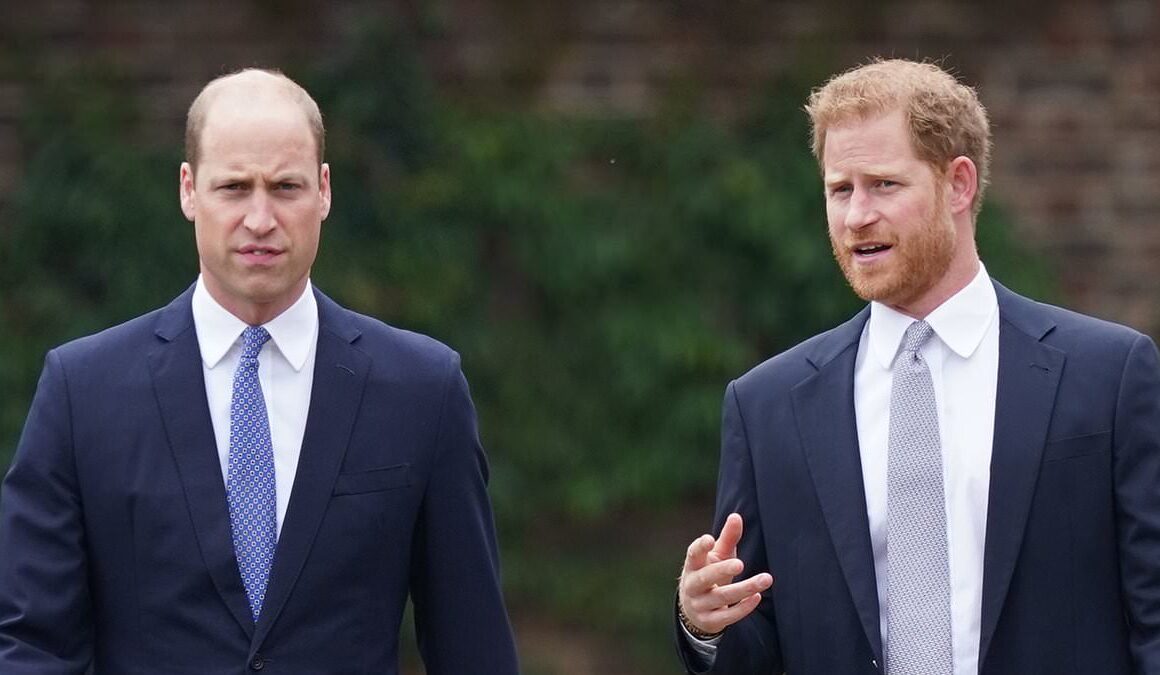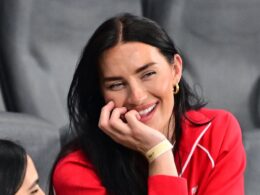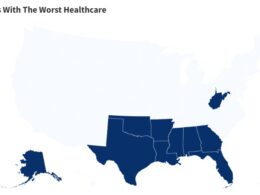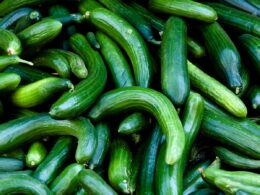The rift between Prince William and Harry will not be healed by the death of their uncle Lord Robert Fellowes, according to experts.
Lord Fellowes, 82, was Queen Elizabeth II‘s private secretary and Diana’s brother-in-law.
He married Lady Jane Spencer in 1978, the elder sister of Diana, and they had three children – Alexander, Eleanor and Laura, who is Princess Charlotte‘s godmother.
Royal commentator Michael Cole told MailOnline that the loss of their uncle will not be enough to bring the warring princes back together.
‘Robert Fellowes’ death will not affect family dynamics,’ he said.
‘Prince William and Prince Harry have always been on good terms with their late mother’s sisters and brother.
‘Apart from offering what will undoubtedly be their heartfelt condolences to their aunt Jane, the two royal princes will experience little if any effect from their uncle’s death.’
Mr Cole added: ‘And it is certain that they will express their sympathies separately, and strictly so, such is the gulf that has opened up between them in recent years, compared with which the Gulf of Mexico is a mere puddle.’

Prince William and Harry at the unveiling of a statue of their mother Diana at Kensington Palace in July 2021. The event was attended by Lady Jane Fellowes, wife of Lord Fellowes

Lord Fellows at the High Court in February 2008 to give evidence in Princess Diana’s inquest
Lord Fellowes was the late monarch’s most important adviser between 1990 and 1999 during the divorces of three of her children and Diana’s death.
He helped the Queen through what she dubbed her ‘annus horribilis’ in 1992 when Charles was at war with Diana, Andrew separated from Sarah, Anne divorced, Windsor Castle went up in flames and public opinion turned against the royals.
Lord Fellowes was also forced to deny bizarre claims by Harrods owner Mohamed Al Fayed that he was involved in a conspiracy to murder his son Dodi and Diana.
In his later life he remained an extra equerry to Elizabeth II until her death in September 2022 and was played by actor Andrew Havill in Netflix series The Crown.
He died of undisclosed causes on Monday and funeral plans have not been revealed.
Reacting to his death, Diana’s younger brother Earl Spencer tweeted this morning: ‘My absolutely exceptional brother-in-law, Robert, is no longer with us.
‘A total gentleman – in all the best meanings of that word – he was a man of humour, wisdom and utter integrity. I’m deeply proud to have been his brother-in-law.’

Queen Elizabeth II and Lord Fellowes aboard the royal yacht Britannia in Florida in May 1991

Lord Fellowes was played by actor Andrew Havill (centre) in Netflix series The Crown


Lord Fellowes had three children – Alexander (left, on his wedding day with Alexandra Finlay in 2013), Laura and Eleanor (both right, at Harry and Meghan’s wedding in Windsor in 2018)
Lord Fellowes was born at Sandringham in 1941 to father Sir William ‘Billy’ Fellowes, its estate manager from 1936 to 1964, who went shooting with King George VI.
His mother Jane Fellowes was the daughter of Brigadier General Algernon Ferguson, high sheriff of Northamptonshire and great-grandfather of Sarah, Duchess of York.
According to an obituary in The Times today, one of the first people to meet him after his birth was the then-Princess Elizabeth who later said: ‘Robert is the only one of my private secretaries I have held in my arms.’
He attended Eton College where he was known as the ‘walking Wisden’ because of his impressive cricket knowledge, but never went to university.
Instead he was commissioned in the Scots Guards and spent three years in the Army from 1960 to 1963, before heading to the City to work for the discount brokers Allen, Harvey and Ross.

King Charles III is pictured today on a visit to the Forsinard Flows Visitor Centre in Scotland

Lord Fellowes marries Lady Jane Spencer at the Guards’ Chapel at Wellington Barracks in London in 1978. To the right of Lady Fellowes is her sister who later became Princess Diana

Lord Fellowes with the King, then Prince Charles, at Epsom Racecourse in Surrey in 1993

Lord Fellowes with Lady Jane Fellowes (right) and their daughter Laura Jane Fellowes (left) at the wedding of William Duckworth-Chad and Lucy Greenwell in Sudbourne, Suffolk, in 2011

The wedding of Lord Fellowes and Diana’s sister Lady Jane Spencer in London in 1978
Then in 1977 he became the Queen’s assistant private secretary – and one year later in 1978 married Lady Jane Spencer, with Diana being a bridesmaid at their wedding.
He rose up the ranks at Buckingham Palace to become deputy private secretary in 1986, and then took over from Sir William Heseltine as private secretary in 1990.
Not long after stepping into the role he helped the Queen through the ‘annus horribilis’ of 1992 which saw her face a series of family scandals including marriage trouble for three of her children – Charles, Anne and Andrew.
On November 20 that year a fire caused major damage to Windsor Castle – destroying 115 rooms, including nine state rooms.
In a speech to more than 500 VIP guests at a Corporation of London Guildhall luncheon on November 24 in 1992 to mark her 40th year on the throne, Elizabeth II said: ‘1992 is not a year on which I shall look back with undiluted pleasure.

Lord Robert Fellowes was the son of the estate manager at Sandringham

Lord Fellowes (top left) with Princess Diana and her family in 1995. Sitting (from left): Diana, Lady Sarah McCorquodale (sister), Frances Shand Kydd (mother), and Jane Fellowes (sister). Standing (from left): Lord Fellowes, Charles, Earl Spencer (brother) and Neil McCorquodale
‘In the words of one of my more sympathetic correspondents, it has turned out to be an ‘Annus Horribilis’. I suspect that I am not alone in thinking it so.’
The Queen’s use of the Latin phrase ‘annus horribilis’, which translates as ‘horrible year’, was a play on the more commonly used phrase ‘annus mirabilis’, meaning ‘year of wonders’.
Then in 1997 when Diana died, the Queen had been at Balmoral at the time of her death and was criticised for not travelling to London sooner.
Lord Fellowes is said to have thought such criticism was unfair, but eventually decided that a change of direction was needed and sped up her return to London.
He also wrote the first draft of her speech to the nation which was widely praised when she referred to herself as ‘your Queen, and as a grandmother’.

Lord Fellowes was the late monarch’s most important adviser between 1990 and 1999

Lord Fellowes is pictured (back right) at the wedding of Prince Charles and Diana in 1981

Lord Fellowes and Lady Jane Fellowes arrive at the High Court for Diana’s inquest in 2008
In 1999 he handed over to his deputy Sir Robin Janvrin and moved back to the city to become chairman of Barclays Private Bank.
Lord Fellowes also became a life peer after leaving the Royal Family, and also worked as a privy counsellor and Prison Reform Trust chairman.
Speaking to the Daily Telegraph in 2008, he said: ‘My life has been spent in quite a gilded cage. Eton, Guards, the royal household and subsequently Barclays.
‘To be introduced to a prison was a culture shock and very salutary.’
Talking about his sister-in-law Diana’s work, Lord Fellowes added: ‘She was very good at it – an extraordinary communicator with a great feeling for the underdog.
‘It never became patronising. She chose the areas where she thought she could make a difference, and on the whole, she did that.’

Prince Harry with Lady Jane Fellowes and uncle Earl Spencer at the unveiling of a statue of his mother Diana in the Sunken Garden at Kensington Palace in London in July 2021

Prince William greets Lady Jane Fellowes at the Diana statue unveiling in London in July 2021

Prince Harry attends the wedding of Lord Fellowes’s son Alexander Fellowes to Alexandra Finlay at the Chapel of St Mary Undercroft in the Houses of Parliament in September 2013

Prince Harry (centre) with Eleanor Fellowes (left) and Alexander Fellowes (right), children of Lord Fellowes, at the wedding of Charles Viscount Althorp to Victoria Lockwood in 1989
And in an interview with The Times in 2003, he explained why he sat on the crossbenches in the Lords.
Lord Fellowes said: ‘In my previous life I had to be apolitical, and it became a habit. It’s difficult for anyone who has been working in the private office of the sovereign to take a party whip.
‘And it suits my temperament to be a crossbencher – though my friends probably regard me as a frightful pinko.’
Lord Robert Fellowes was born on December 11, 1941 and died on July 29, 2024











